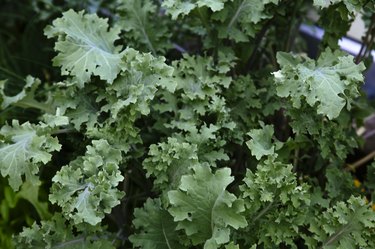
L-lysine is one of the essential amino acids – your body can't manufacture it so you must get it from dietary sources. L-lysine is used in the manufacture of collagen, the protein substance that forms connective tissue such as tendons and cartilage. L-lysine is primarily found in protein foods such as meat, eggs, cheese and tofu. It can also be found in some plant proteins. Vegetables in general do not contain high amounts of L-lysine, but some vegetables contain more than others.
The Top Three
Video of the Day
Spinach, kale and watercress are the top three green leafy vegetables for L-lysine, according to Dr. Dennis Clark, a botanist who specializes in plant chemistry. Kale leads the pack with 197 milligrams of L-lysine in a 100-gram serving. Spinach -- both raw or cooked -- is next, with 178 milligrams of L-lysine per 100 grams. Watercress contains 165 milligrams of L-lysine in 100 grams.
Video of the Day
Next Best
Romaine lettuce and Swiss chard are nearly equal in L-Lysine content. Romaine lettuce contains 103 milligrams and Swiss chard 100 milligrams of L-Lysine in a 100-gram serving. The amount of L-Lysine in 100 grams of turnip greens is 98 milligrams, while Chinese cabbage contains 88 milligrams. Iceberg lettuce and collards are next on the list, with 80 milligrams and 75 milligrams of L-lysine respectively. Clark says endive, beet greens and regular cabbage have the least L-lysine in 100 grams, with 64 milligrams or less in each vegetable.
Vegetables vs. Protein
Although some vegetables are better choices of L-lysine than others, leafy green vegetables are not L-lysine-rich in comparison to protein foods. A 100-gram serving of a leafy green vegetable is about 3 1/2 ounces. In comparison, 1 ounce of Swiss cheese contains 733 milligrams of L-lysine, 3 ounces of salmon contains 1,550 milligrams and a pound of porterhouse steak contains 6,560 milligrams of L-lysine, according to Clark.
Lysine Deficiency
There is no official recommended daily allowance for L-lysine. An L-lysine deficiency can result in nausea, dizziness, fatigue or loss of appetite, as well as anemia and disorders of the reproductive system. Children do not grow properly without L-lysine; it is necessary for your body to produce carnitine, a nutrient that converts fatty acids to energy. Athletes and people who have been badly burned may have a higher need for L-lysine. Vegans who don't eat beans may not obtain sufficient L-lysine from their diet.